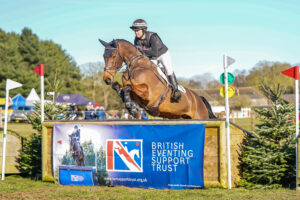A lot of our followers are either current or former event riders or owners and fans, so we probably don’t need to tell you that the 2025 eventing season is almost upon us! With the first BE competition taking place at Poplar Park and Epworth Equestrian on Saturday 1st of March and a packed calendar lined up after that, riders up and down the country will be busy getting horses fit and ready for their seasonal debut. Whether you find competition days nerve wracking or exciting – or something in the middle – there are plenty of things you can do to help make events go more smoothly. Whether you’re a seasoned competitor or stepping up a level, time spent preparing is never time wasted, so here’s our tried and tested checklist. It will help you tick off the essentials, from tack checks to transport safety, so you’re ready to hit the ground running.
Check your tack and safety equipment
You might be digging out kit you haven’t used since the end of last season or giving everyday tack a spruce up after the winter, but there are two key elements to check. Firstly, is your tack and safety kit in good shape? That means checking your bridle, breastplate/martingale and saddle for loose stitching, rust on buckles and cracks in the leather. Also, examine your bits for any wear and tear, sharp edges or rust. Then, once you know it’s in good shape, it’s all about ensuring that your kit is legal and compliant for the season ahead. Check British Eventing and other governing bodies you plan to compete under to see if there’s been any changes on permitted bits, the tags on hats and body protectors and so on. That way you can set off for day one knowing you’re legal, safe and ready to go!
Carry horse and human first aid kits
An equine first aid kit should be packed on the lorry or trailer every time you use it, and there’s quite a bit that we recommend you carry for a day’s eventing. Here’s a checklist to get you started if you plan to build your own, or you want to check a ready-made kit has everything you need:
- A clean bucket and towel
- A roll of cotton wool
- A roll of gamgee
- Vetwrap and tape
- Sterile dressings
- A ready-made poultice
- Saline solution and antibacterial scrub
- Wound gel
- A thermometer (and some lubricant like Vaseline!)
- A spare hoof pick, baler twine and headcollar/lead rope
- Disposable gloves (a couple of pairs)
- A headtorch
- Safety scissors and tweezers
We know so many riders who carry an incredible first aid kit for their horses… but not one for themself. We all know that accidents can happen around horses, and at the very least you might end up with a headache, get stung or bitten by an insect so having a well-stocked first aid kit is essential. You can buy excellent pre-packed kits designed for hikers that include plasters, blister packs, dressings, wipes, painkillers, antihistamine cream, a foil blanket and a basic sling and bandages. More advanced packs can also include an eye bath, tweezers and a thermometer. Or you can build your own first aid kit and include all this and more!
Don’t forget to carry emergency information, especially if you compete and travel alone. That might mean leaving a card in your lorry or car window with your name, emergency contacts and any medical details, and let your emergency contact know when you’re competing.
Transport checks before you travel
Hands up how many of you have had a transport issue that’s nearly (or totally) derailed your day out eventing? While some transport issues are unavoidable, some time spent making sure your transport is roadworthy will give you peace of mind on event day.
MOT and servicing: It’s essential to ensure your lorry or towing vehicle is up to date with its MOT and any necessary servicing. No-one needs to realise that their MOT is out of date on the morning of a competition!
Trailer safety checks: If you use a trailer then make sure you regularly inspect the floor, ramp, hitch and brakes and the internal partitions and breast bars. We also recommend you check tyre pressure and ensure you have a spare tyre too! If you’re keen to make sure your trailer is as safe as possible, it might interest you to know that you can access free safety checks for trailers under 3,500kg from the National Trailer and Towing Association – check it out here.
Towing vehicle: Make sure you check towing eyes are accessible and all lights and indicators are working when you’re hitched up. We also recommend you carry a reflective triangle, high-vis vest and head torch in case of emergencies on the road.
We hope these tips help you make travelling and competing as stress free and safe as possible. Taking a little bit of time now to check your tack, transport and first aid kits will ensure you feel prepared and are equipped if anything does go wrong on the day. From everyone at the British Eventing Support Trust, we’re wishing you a fantastic eventing season ahead – see you out on course!



